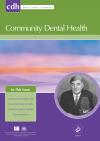Community Dental Health

- Cover Date:
- December 2016
- Print ISSN:
- 0265 539X
- Vol:
- 33
- Issue:
- 4
Psychometric properties of the English version of the Oral Health Literacy Adults Questionnaire - OHL-AQ
Objective: To test the psychometric properties of the Oral Health Literacy Adult Questionnaire (OHL-AQ) in English. The OHL-AQ was designed to test functional oral health literacy in general populations and was initially validated in Iran. Methods: The instrument was administered to 405 adult subjects (mean age 45 (SD 16) years and 67% female) attending the 2014 Minnesota State Fair. The OHL-AQ is composed of 17 items measuring four conceptual dimensions: reading comprehension, numeracy, listening, and decisionmaking. Participants selected the best answer for written or verbally administered items and entered answers on an electronic tablet. Item responses for each individual were combined into a summary score (range 0–17) with higher scores indicating better oral health literacy. Score dimensionality, reliability, and validity were investigated. Results: For dimensionality, both exploratory factor analysis and a parallel analysis yielded evidence for scale unidimensionality. Reliability was sufficient indicated by a Cronbach’s alpha >0.74. Validity of scores was supported by “small†and “medium†effect sizes for construct validity. “Small†effect sizes were observed for global oral health self-report, OHIP-5 scores, treatment urgency, and having a regular dentist. “Medium†effect sizes were seen for presence of dentures, number of natural teeth present, and educational level. Conclusions: Dimensionality, reliability and validity of the English version of the OHL-AQ in a general adult English-speaking population is supported, providing sufficient psychometric properties in an important target population of the instrument.
Key words: health literacy, psychometrics, factor analysis, functional oral health literacy, instrument validation, OHL-AQ
doi:10.1922/CDH_3868Flynn07
- Article Price
- £15.00
- Institution Article Price
- £
- Page Start
- 274
- Page End
- 280
- Authors
- P.M. Flynn, M.T. John, A. Naik, N. Kohli, J.J. VanWormer, K.Self
Articles from this issue
- Title
- Pg. Start
- Pg. End
- An intervention study to assess the effectiveness of a reminder telephone call in improving patient appointment attendance at a Community Dental Service clinic
- 239
- 241
- Patient characteristics in relation to dental care payment model: capitation vs fee for service
- 252
- 256
- Psychometric properties of the English version of the Oral Health Literacy Adults Questionnaire - OHL-AQ
- 274
- 280
- Approximal caries increment in relation to baseline approximal caries prevalence among adolescents in Sweden with and without a school-based fluoride varnish programme
- 281
- 285
- Variation in methods used to determine national mean DMFT scores for 12-year-old children in European countries
- 286
- 291
- The relationship between maternal smoking during pregnancy and parental-reported experience of dental caries in Indigenous Australian children
- 297
- 302
- Dental problems and Familismo: social network discussion of oral health issues among adults of Mexican origin living in the Midwest United States
- 303
- 308
